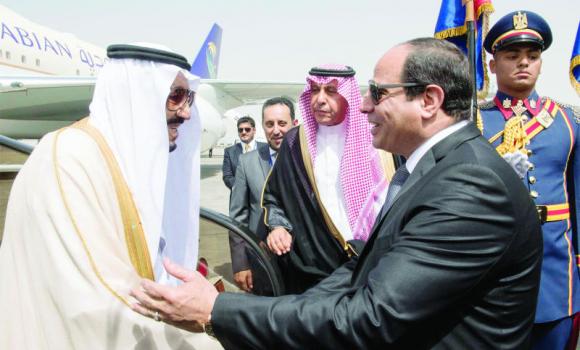
Riyadh-Cairo business talks to explore opportunities
Commerce and Industry Minister Tawfiq Al-Rabiah will lead the Saudi delegation at the fifth session of the Saudi-Egyptian Joint Committee which will be held in Cairo on Saturday in conjunction with the visit of Custodian of the Two Holy Mosques King Salman on Thursday.
The Egyptian side will be chaired by Minister of Commerce and Industry Tariq Kabeel. This 5th session will also be held in conjunction with the Saudi-Egyptian Commercial and Investment Forum and a concurrent Saudi Exports Exhibition.
Besides Al-Rabiah, Agriculture Minister Abdul Rahman Al-Fadli will attend. On the Egyptian side, aside from Kabeel, Minister of Investment Dalia Khursheed, as well as a number of officials, specialists and businessmen are expected to attend.
The forum aims to discuss Saudi-Egyptian business opportunities, and the factors of investment in the Kingdom and Egypt in the fields of agricultural, food industries, and commercial, industrial and renewable energy.
The exhibition will be organized by the Saudi Exports Development Authority for marketing Saudi products outside the Kingdom, particularly for Arab and other international markets.
The Saudi-Egyptian Business Opportunities Forum will review the most prominent current and future investment projects, in which private investors from both countries can participate. Discussions will elaborate incentives and advantages offered by the governments of the two countries for investors to encourage them to enter into joint investment projects.
The forum will also discuss how to attract national and international investors to achieve sustainable investments in various fields, in addition to the exchange of expertise and human knowledge in all forum issues to achieve sustainable economic developments in both countries.
As a preamble to Saturday's meeting, a special preparatory committee meeting, which met this week in Cairo, discussed a number of important topics, notably the promotion of trade exchange between the two countries, and developing facilities that contribute to multiplying and increasing trade and investment in the two countries.
The difficulties facing Saudi investments in Egypt will be discussed at the Joint Business Council Meeting and a number of different topics will also be studied in areas such as health, culture, education and technology transfer.
Moreover, a scheduled follow-up will be specified to enable the specialized work teams to put the recommendations into action.
The volume of trade exchange between Saudi Arabia and Egypt for 2015 reached SR23.806 million, while the Kingdom’s exports in the same year reached SR15.197 million, and the imports SR8.609 million. The trade balance favors the Kingdom.
Saudi Arabia, the UAE and Kuwait are the main financial backers of El-Sisi’s government, having pledged around $12 billion to it since he came to power.
Saudi Arabia is the largest Arab investor in Egypt with investments reaching some $5.7 billion (SR21.3 billion), or 27 percent of the Arab totals invested in that country.
Total Arab investments in Egypt reached $20 billion (SR75 billion). The UAE was the second largest investor at $4.5 billion (21.4 percent), followed by Kuwait at $2.7 billion (11.2 percent)
The volume of trade between the Kingdom and Egypt is estimated at $5 billion (SR18.75 billion) but increased by 1.7 percent in 2012 compared to figures of 2010, whereas Egyptian exports grew by 7.1 percent.
During the aforementioned period, Egyptian imports from the Kingdom dropped 1.9 percent, which led to the drop in the balance of payments between the two countries by 19 percent.
In 2012, Egypt ranked 17th on the list of exporting countries to the Kingdom, or equivalent to 1.3 percent of the Kingdom’s imports, but ranked 24th on the list of top importers from the Kingdom, or 0.7 percent of the Kingdom’s exports.
Major commodities exported by Egypt to the Kingdom included electrical cables, construction materials, agricultural products, notably citrus fruits, rice, onions, potatoes, fresh vegetables and fruits, food items such as cheese and frozen vegetables, juice concentrates, paper products, electrical appliances, especially cookers and ovens, and furniture.
Egypt imported from the Kingdom items such as diesel, LPG, cars and other petroleum products, oils and petrochemicals.
Saudi Ambassador to Egypt Ahmad Al-Qattan recently said that low oil prices will not prevent the Kingdom from supporting the Egyptian economy.
He said Saudi support would help ease an acute dollar shortage and reduce pressure on the Egyptian government’s budget.
“The confidence of the Arab and Saudi investors will increase after the announcement of the increase in investments. Saudi-Egyptian relations will gain in strength by the day. Saudi aid will help Egypt push ahead with an energy subsidy reform program that seeks to reduce spending on petroleum products from its current level of about $600 million a month,” Al-Qattan said at a recent press conference held in Cairo.
The ambassador said it is not acceptable for someone to distort Saudi-Egyptian relations, which are solid and stable. He said that Custodian of the Two Holy Mosques King Salman’s decisions have proved that the Kingdom is interested in supporting and improving the Egyptian economy through raising Saudi investments and supporting the energy sector.

























